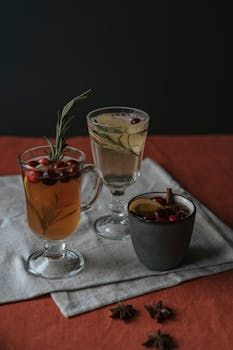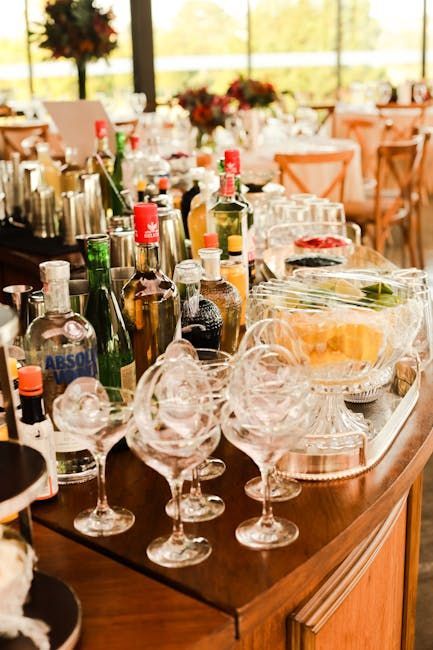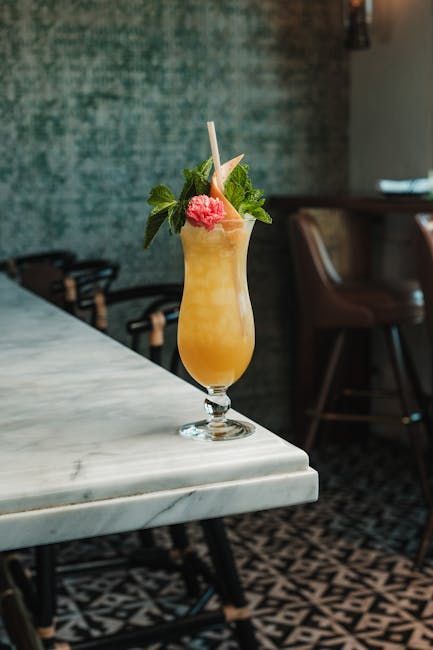Seasonal Ingredients and Sustainable Practices: The Future of Event Bartending
The modern event industry stands at a crossroads where luxury meets responsibility, and nowhere is this intersection more visible than in craft cocktail service. As guests become increasingly conscious of their environmental impact and demand transparency about ingredient sourcing, mobile bar services have evolved to meet these expectations while maintaining the premium quality that defines memorable celebrations. The integration of seasonal, locally sourced ingredients with sustainable bartending practices represents more than just a trend. It embodies a fundamental shift in how we approach event hospitality, creating experiences that delight guests while honoring our commitment to environmental stewardship and community support.
This transformation in bartending philosophy affects every aspect of cocktail creation, from the spirits selected to the garnishes adorning each glass. Forward-thinking mobile bar services recognize that sustainability enhances rather than compromises quality, allowing hosts to offer guests exceptional drinks that tell authentic stories about their origins and the careful thought behind their creation. When bartenders explain that the basil garnishing summer cocktails came from a local farm just miles away, or that seasonal berries were picked at peak ripeness that morning, they create connections between guests, their drinks, and the broader community that transcends typical bar service.
The benefits of embracing seasonal ingredients and sustainable practices extend far beyond environmental concerns. These approaches result in superior flavor profiles as ingredients reach bars at their peak freshness, support local agricultural communities and economies, reduce transportation environmental impact, inspire creative menu development that keeps offerings fresh and exciting, and create compelling narratives that enhance guest engagement with their beverages. The cumulative effect transforms standard cocktail service into an experience that resonates with modern values while delivering uncompromising quality.
1. The Flavor Revolution of Seasonal Ingredients
The difference between cocktails crafted with seasonal ingredients versus those made with year-round supermarket products becomes immediately apparent in the glass. Seasonal fruits and herbs arrive at peak ripeness when their flavors reach maximum intensity and natural sugars achieve perfect balance. Summer strawberries picked in June possess sweetness and complexity that winter imports simply cannot match, while autumn persimmons offer unique flavors impossible to capture any other season. Professional bartenders understand that ingredient timing dramatically impacts cocktail quality, making seasonal sourcing essential rather than optional for premium service.
Working with seasonal ingredients demands creativity and adaptability that keeps cocktail menus dynamic and exciting throughout the year. Spring might feature cocktails highlighting fresh mint, early berries, and rhubarb with their bright, awakening flavors perfect for garden weddings and outdoor celebrations. Summer brings opportunities to showcase stone fruits, cucumbers, watermelon, and abundant herbs like basil and cilantro that create refreshing drinks ideal for warm weather events. Autumn's arrival signals the time for apple cider, pears, figs, and warming spices that complement harvest celebrations and corporate gatherings. Winter transforms cocktails through citrus fruits at their peak, pomegranates, cranberries, and root vegetables like ginger that create rich, complex flavors perfect for holiday parties.
The educational component of seasonal cocktails adds tremendous value to event experiences. When bartenders explain why specific ingredients appear in certain seasons and describe how flavors evolve throughout the year, they create engagement that transcends simple drink service. Guests discover fascinating connections between agricultural cycles and their beverages, learning about local growing seasons and developing appreciation for ingredients they might otherwise overlook. This knowledge enriches their overall event experience while building anticipation for future seasonal offerings that might appear at subsequent celebrations.
Flavor intensity achieved through seasonal sourcing allows bartenders to use simpler preparations that let ingredients shine. Rather than masking mediocre produce with excessive sugar or complex flavor combinations, seasonal cocktails celebrate ingredient quality through straightforward presentations that highlight natural characteristics. A summer cocktail might feature just muddled strawberries, fresh basil, quality vodka, and a touch of lemon, allowing each component to contribute its peak-season flavor without competition. This simplicity paradoxically creates more sophisticated drinking experiences because guests taste authentic ingredient flavors rather than artificial enhancements.

2. Building Relationships with Local Producers
Successful integration of local ingredients requires developing strong relationships with farmers, urban gardens, and artisan producers in the surrounding community. These partnerships benefit everyone involved while creating supply chains that deliver exceptional quality. Local farmers gain reliable customers for products that might not fit traditional retail channels, such as imperfect produce perfect for muddling or juicing, or abundance from bumper crops. Mobile bar services receive consistent access to premium ingredients at peak freshness while supporting their local agricultural economy. Event hosts can share compelling stories about their cocktail ingredients that resonate with guests who value community support and sustainable practices.
Farmers' markets serve as excellent resources for discovering seasonal treasures and connecting with producers who share values around quality and sustainability. Regular market visits allow bartenders to develop relationships with farmers, learn about upcoming harvests, and discover unique ingredients that inspire creative cocktails. A conversation with a berry farmer might reveal that tayberries will be available for just two weeks in early summer, inspiring a special cocktail for upcoming June events. An herb grower might mention experimenting with unusual varieties like pineapple sage or chocolate mint, opening possibilities for innovative flavor combinations that set events apart from standard offerings.
Community Supported Agriculture programs and direct farm relationships create particularly valuable partnerships for mobile bar services with consistent event schedules. These arrangements guarantee ingredient access while supporting small farms through predictable income. Some mobile bar services establish formal partnerships where they purchase specific crops grown primarily for their events, such as edible flowers for garnishes or unusual herbs for signature cocktails. These deeper collaborations benefit both parties while ensuring ingredient consistency and quality that elevates every event served.
Urban agriculture partnerships offer exciting opportunities in metropolitan areas where traditional farmland might be distant. Rooftop gardens, vertical farms, and community gardens produce remarkable quantities of herbs, microgreens, and specialty produce perfect for cocktail garnishes and flavoring. These hyperlocal sources provide unbeatable freshness since ingredients might travel just across town rather than across states, while supporting urban greening initiatives that benefit entire communities. Event hosts particularly appreciate these stories, as they demonstrate commitment to sustainability even in urban environments where sourcing local ingredients presents unique challenges.
3. Sustainable Practices Beyond Ingredients
Environmental responsibility in mobile bar service extends well beyond ingredient sourcing to encompass every operational aspect. Waste reduction strategies dramatically decrease environmental impact while often improving efficiency and reducing costs. Composting programs capture organic waste from citrus peels, spent herbs, and fruit pulp, transforming potential landfill contributions into valuable soil amendments. Some mobile bar services partner with local gardens or farms to ensure their organic waste returns to the soil, completing the agricultural cycle while demonstrating commitment to zero-waste principles.
Water conservation represents another crucial sustainability focus in professional bar operations. Techniques like batch cocktail preparation reduce water usage during events while ensuring consistency across hundreds of drinks. Careful planning around ice needs prevents waste from over-production while efficient washing systems minimize water consumption during equipment cleaning. Some mobile bar services track water usage across events, setting reduction goals that demonstrate measurable environmental improvement alongside maintained service quality.
Packaging and disposable item choices significantly impact event sustainability profiles. Forward-thinking mobile bar services default to reusable glassware, metal straws, and cloth napkins that eliminate disposable waste while creating more elegant presentations that guests prefer. When disposables become necessary for certain event types, selecting compostable or recyclable options manufactured from sustainable materials minimizes environmental impact. Some services even partner with composting facilities to ensure compostable items actually reach appropriate processing rather than ending in landfills where they cannot break down properly.
Energy efficiency considerations influence equipment selection and operation strategies. Choosing energy-efficient refrigeration for mobile setups, planning transportation routes to minimize fuel consumption, and batching preparation tasks to reduce equipment running time all contribute to reduced environmental footprints. While individual impacts might seem small, cumulative effects across dozens or hundreds of events annually create meaningful environmental benefits that align business operations with sustainability values.
4. Creating Zero-Waste Cocktail Programs
Zero-waste cocktail development challenges bartenders to reimagine every aspect of drink creation, turning supposed waste into valuable ingredients that enhance rather than detract from quality. Citrus peels that might typically face disposal become valuable sources for house-made bitters, infused spirits, or dehydrated garnishes that add visual appeal and subtle flavor notes. Orange peel twisted over a cocktail releases aromatic oils before becoming a beautiful garnish rather than trash, while larger pieces can be candied for dramatic presentations or dried for later use in spice blends and tea infusions.
Herb stems often possess intense flavors that rival their more commonly used leaves, making them perfect for syrups, infusions, and garnishes. Mint stems steeped in simple syrup create subtle mint flavoring for cocktails, while tougher stems like rosemary can infuse spirits or become aromatic stirrers that release fragrance as guests sip their drinks. This holistic approach to ingredient usage reduces waste while extracting maximum value from every purchase, lowering costs while enhancing sustainability credentials.
Fruit pulp remaining after juicing contains tremendous potential for creative applications. Strawberry pulp can be cooked down with sugar to create natural fruit syrups, while citrus pulp might be dehydrated and powdered for cocktail rimmers that add subtle flavor dimension. Some bartenders incorporate fruit pulp into house-made sodas or shrubs, creating complex non-alcoholic bases that elevate mocktails to equal standing with their alcoholic counterparts. These zero-waste techniques demonstrate that sustainability and creativity go hand in hand rather than existing in opposition.
Seasonal composting of unavoidable organic waste closes the loop on ingredient lifecycle. Rather than viewing spent garnishes, over-ripe fruit, and citrus peels as trash, progressive mobile bar services compost these materials, returning nutrients to soil that will grow future crops. Some services partner with the same local farms supplying their ingredients, creating circular systems where farm produce becomes cocktail ingredients and cocktail waste becomes farm compost. These relationships exemplify sustainable thinking while creating compelling narratives that event hosts can share with their environmentally conscious guests.
5. Educating Guests About Sustainable Choices
The stories behind sustainable and seasonal ingredients provide tremendous value beyond the drinks themselves, creating engagement opportunities that enhance guest experiences. When bartenders explain ingredient origins, describe relationships with local farmers, or discuss sustainable practices employed throughout service, they transform simple drink delivery into educational moments that resonate with modern values. These conversations often inspire guests to consider their own consumption patterns and seek similar approaches in their daily lives, extending impact beyond the event itself.
Menu design offers powerful opportunities to communicate sustainability commitments while building anticipation for seasonal offerings. Rather than generic cocktail names, descriptions that highlight local farms, seasonal availability, and sustainable practices create intrigue that encourages guests to try new drinks. A menu item like "Summer Garden Mojito featuring mint and strawberries from Sunrise Valley Farm" tells a story that generic labeling cannot match, while building appreciation for the thought and care behind each cocktail creation.
Visual elements throughout events can reinforce sustainability messaging in subtle yet effective ways. Small signs near bars explaining seasonal ingredient sourcing, compostable item usage, or zero-waste practices educate guests without preaching. Some mobile bar services create beautiful displays featuring the day's local ingredients before preparation, allowing guests to see and smell fresh produce while learning about its origins. These visual touches create Instagram-worthy moments that guests enthusiastically share, spreading sustainability messaging to wider audiences beyond event attendees.
Interactive elements like allowing guests to select from various seasonal garnishes or explaining house-made syrup creation processes create memorable engagement that strengthens connections between attendees and their beverages. When guests participate in choosing fresh herb garnishes or learn about the three-day process behind house-made ginger syrup, they develop appreciation for craft cocktail creation that transforms them from passive consumers into engaged participants. This education builds loyalty and enthusiasm that often leads to future bookings as guests remember not just great drinks but meaningful experiences.
Conclusion
The integration of seasonal ingredients and sustainable practices in event bartending represents the future of premium mobile bar service. As environmental consciousness continues growing among event hosts and guests alike, services that authentically embrace these values while maintaining uncompromising quality will increasingly separate themselves from competitors still relying on conventional approaches. The benefits extend in every direction: superior flavors that delight guests, reduced environmental impact that honors our planet, support for local agricultural communities that strengthens regional economies, and compelling narratives that create deeper engagement with the event experience.
Forward-thinking hosts recognize that choosing mobile bar services committed to seasonality and sustainability aligns their events with their values without sacrificing the premium experience their guests deserve. These approaches often enhance rather than limit creativity, as seasonal constraints inspire innovative solutions and unexpected flavor combinations that keep menus fresh and exciting. The stories behind sustainably sourced, seasonally inspired cocktails add layers of meaning that transform simple refreshment into memorable experiences that guests discuss long after events conclude, building lasting impressions that reflect positively on hosts and their commitment to thoughtful celebration.





